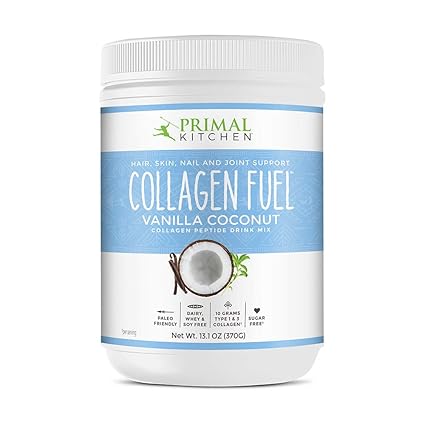Which fruits contain collagen?
Which fruits contain collagen?
5 foods rich in collagen to stay young
In our blog we have already talked about why collagen levels are reduced with age. It is a physiological process that can be prevented thanks to proper nutrition and the use of supplements. Some foods more than others help us to prevent the effects of aging and even allow to stimulate the production of collagen.
Discover the 5 collagen-rich foods that take care of your health and beauty!
5 foods rich in collagen
The sardines and the blue fish in general are foods rich in collagen. Collagen represents 25% of the proteins present in the human body. It is produced in cells from essential amino acids such as lysine, proline and glycine.
Some foods are especially indicated to stimulate the production of collagen because they contain good doses of these amino acids and other antioxidant substances:
Primal Kitchen Collagen Fuel Protein Mix, Vanilla Coconut - Non-Dairy Coffee Creamer & Smoothie Booster- Supports Healthy Hair, Skin, Nails and Joints, Promotes Muscle Repair
- Lemon. This fruit is known for its high contribution of vitamin C, an antioxidant of vital importance to fight free radicals and essential for the synthesis of collagen.
- Lean meats and blue fish (especially wild salmon and tuna) are foods rich in lysine, a basic amino acid in the composition of collagen. The fish, in addition, provide good doses of omega 3 fatty acids with benefits for the skin.
- Vegetables. Beans, lentils, chickpeas and other foods in this category contain good amounts of glycine. Another amino acid essential for the production of proteins.
- Peanuts These roots that are usually considered nuts are rich in mineral salts, vitamins (A and B), proteins and unsaturated fatty acids.
- Fruits and vegetables in purple, red and orange. All vegetables, but especially those with these characteristics are high in antioxidants. They provide basic substances for the production of collagen and act by preventing the effects of time
Is a good diet enough?
The lemon contains vitamin C, food necessary for the synthesis of collagen in the body
In normal health conditions, if you consume organic foods with high nutritional value and follow a healthy lifestyle (you exercise every day, do not smoke, do not consume processed foods, sugar, do not drink alcohol) your body will receive stimuli and substances to produce collagen.
If you comply with all the previous recommendations, congratulations and keep it up! Otherwise, do not despair. We all know that achieving all these elements together on a day-to-day basis is complicated in practice.
The ideal is to try, of course, and take advantage of the benefits of quality supplements to integrate the lack of nutrients in the diet or mitigate the effects of age.
Also, keep in mind that age is not the only factor of collagen deterioration:
- Periods of strong stress have degenerative effects on the body. They affect the production of collagen causing premature aging of the skin, hair and nails, and other consequences.
- Exposure to the sun's rays without proper protection degenerates the collagen present in the skin and increases the appearance of wrinkles and other signs of aging.
- The sedentary life affects most of the physiological processes and comes to affect the processes of collagen production.
- On the contrary, people who have a very active life on a physical level more easily wear out their reserves of collagen.
- The same happens in the elderly, whose production of collagen decreases markedly and can cause disease such as osteoporosis.
- The impoverishment of the soil caused by intensive cultivation and the consumption of fast foods, unfortunately reduce the quality of the nutrients in our diet. This, as we have seen, can unbalance collagen levels in the body.
- Integrating your diet with supplements based on hydrolyzed collagen and minerals is an easy and safe solution at your fingertips. Of course, to make the results even more satisfactory, try to follow a diet as balanced as possible and cultivate healthy habits.
